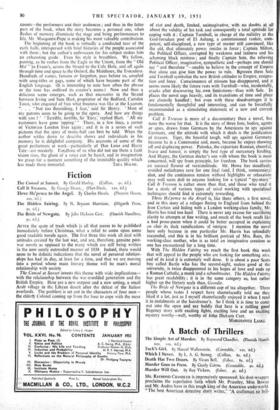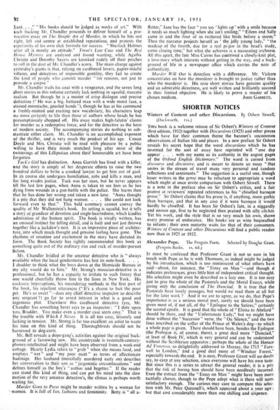A Batch of Thrillers
The Simple Art of Murder. By RaymoneChandler. (Hamish Hamil- ton. los. 6d.)
MR. RAYMOND CHANDLER is impressively sponsored; his dust-wrapper proclaims the superlative faith which Mr. Priestley, Miss Bowen and Mr. Auden have in this tough king of the American underworld. "The best American detective story writer," "A craftsman so bril-
liant. ," " His books should be judged as works of art." With such backing Mr. Chandler proceeds to deliver himself of a pro- vocative essay on The Simple Art of Murder, in which he hits out right, left and centre at established reputations, and protests the superiority of his own slick formula for success. " Sherlock Holmes after all is mostly an attitude." Trent's Last Case and The Red House Mystery are analysed and found wanting, while Agatha Christie and Dorothy Sayers are knocked rudely off their perches to roll in the dust of Mr. Chandler's scorn. The main charge against yesterday's giants is that, relying on cardboard lovers, papier-mfiché villains, and detectives of impossible gentility, they fail to create the kind of people who commit murder " for reasons, not just to provide a corpse."
Mr. Chandler trails his coat with a vengeance, and the seven long short stories in this volume certainly lack nothing in squalid, staccato realism. But though he is a master of crisp dialogue and precise definition (" He was a big, battered man with a wide moist face, a stained moustache, gnarled hands "), though he has at his command a freshly-minted and exciting new vocabulary, his characters leap no more certainly to life than those of authors whose heads he has presumptuously chopped off. His essay makes high-falutin' claims for murder as a redemptive force, and for the detective as the hero of modern society. The accompanying stories do nothing to sub- stantiate either claim. Mr. Chandler is an accomplished exponent of the thriller, and is very much the product of his age. Conan Doyle and Mrs. Christie will be read with pleasure by a public willing to have their minds stretched long after most of the t witterings of this Lilliputian about then' honourable art have been forgotten.
Tuck's Girl has distinction. Anna Garrish has lived with a killer, and the story is simply of her desperate efforts to raise the two hundred dollars to bribe a crooked lawyer to get him out of gaol. In its course she undergoes humiliation, robs and kills a man, and for long evades justice. Tuck was her man, but he never appears till the last few pages, when Anna is taken to see him as he lies dying from wounds in a gun-battle with the police. She learns then that he has done her wrong and taken a new love. "Anna thought It a pity that they did not hang women. . . . She could not look forward even to that." This bald summary cannot convey the quality of Mr Wallenstein's book. Its setting is squalid, but it tells a story of grandeur of devotion and single-heartedness, which kindles admiration of the human spirit. The book is vividly written, has an unusual instinct for telling detail, and is built and not just thrown together like a jackdaw's nest. It is an impressive piece of architec- ture, into which much thought and genuine feeling have gone. The rhythms of emotion and excitement in the story have dictated its form. The Book Society has rightly recommended this book as something quite out of the ordinary run and ruck of murder-pursuit fiction.
Mr. Chandler bridled at the amateur detective who is " always available when the local gendarmerie has lost its note-book. . . I shudder to think what the boys down at the Homicide Bureau in my city would do to him." Mr. Strong's musician-detective is a professional, but he has a capacity to irritate to such frenzy that one would cheerfully throw him to the lions in New York. His cocksure interruptions, his meandering methods in the first part of the book, his repellent utterances (" It's a shame to bait the poor pet. He's so sweet "—does any chief detective inspector so describe any sergeant ?) go far to arrest interest in what is • a good and ingenious plot. Elsewhere this cardboard detective (yes, Mr. Chandler has something here) says to an inspector: " I dote upon you, Bradder. You make even a murder case seem cosy." That is the trouble with Which I Never. It is all too cosy, leisurely and lacking in tension. Mr. Strong is far too excellent an artist to waste his time on this kind of thing. Thoroughbreds should not be harnessed to dog-carts.
Mr. Bell reveals a dope-gang's activities against the original back- ground of a farrowing sow. His countryside is twentieth-century- phoney-intellectual and might have been observed from a week-end cottage. Hearty Lydia refers to " grub " when she means food, and employs " wet " and " my poor mutt " as terms of affectionate badinage. Her husband (mercifully murdered early on) describes her conversation to their son as " jargonistic circumlocutions " and defines himself as the boy's " author and begetter." If the reader can stand this kind of thing, and can put his mind into the slow motion of the very amateur detective's, the climax is perhaps worth waiting for.
Murder Goes to Press might be murder written by a woman for women. It is full of fun, fashions and femininity. Betty is " all a- flutter," Jane has the face " you say ' lights up' with a smile because it needs so much lighting when she isn't smiling," "Eileen and Sally came in and the.four of us twittered like birds before a storm." Theo the narrator projects herself as ' the jolly young lady," "the madcap of the fourth, due for a real pi-jaw in the head's study, conic closing time," but what she achieves is a nauseating archness. All this apart, the late Miss Cairns has contrived a closely-knit plot, a love-story which interests without getting in the way, and a back- ground of life in a newspaper office which carries the note of authenticity.
Murder Will Out is detection with a difference. Mr. Vickers concentrates on how the murderer is brought to justice rather than who the murderer is. His nine short stories have genuine quality and an admirable directness, are well written and brilliantly succeed in their limited objective. He is likely to prove a master of his



































 Previous page
Previous page